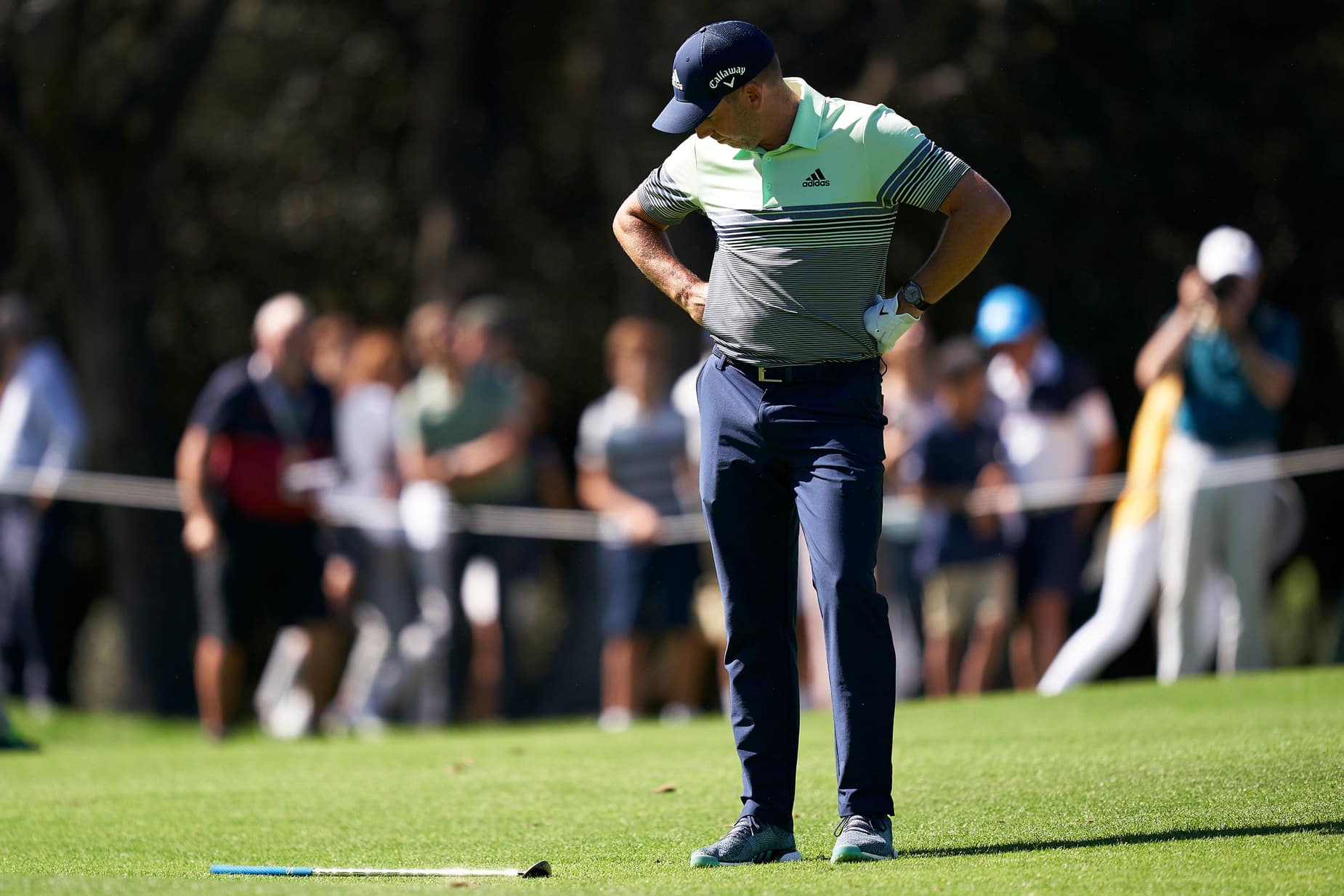Golf, Fear & Anxiety
I recently wrote an article about golf after the first coronavirus lockdown in the UK and how, many of my clients had enjoyed some extra freedom and performed really well on their return to golf.
For many, this experience was temporary and was then followed by more anxiety than ever.
I would like to share with you some observations from twenty years of working with golfers suffering from performance issues around fear and anxiety.

It’s normal for us to feel fear or anxiety when playing golf. A difficult chip over a bunker to a tight pin with water behind will often get our heart rate up and our palms sweating. Perhaps it’s a particularly tight tee shot that pushes your buttons or a it could be a smelly little putt.
Alternatively, some clients tell me that the easier the shot the more anxiety they feel.
For many golfers this anxious feeling is a signal to panic.
” Oh no. Here we go again” is the mantra for struggling golfers. They will then proceed to try lots of things to make this feeling go away.
It doesn’t matter what you do, you cannot stop this feeling, this emotion. Fear & Anxiety.
Many golfers who struggle have an unhealthy relationship with FEAR.
So what is your relationship with FEAR when it shows up in golf?
I recently listened to Dustin Johnson after he won The Masters. Leading by four going into the final round, he said that he was nervous for the whole round. What he also said was that he was expecting it.
So many golfers who struggle with performance anxiety of any kind, do not have the healthy relationship with Fear that DJ has.

Because Fear & Anxiety makes some golfers feel so uncomfortable, they do their best to try and escape it by doing one of these. See if you can identify yourself in this list.
They might try and fight it or defeat it.
Try to ignore it or deny it.
Try to control it.
They might get angry or they might feel weak.
Instead of expecting Fear to show up, like DJ did, struggling golfers hope and pray that it won’t. This resistance then creates more tension.
This is often the start of a much bigger problem. Not only do you have a difficult shot to play, you also have to use up a lot of energy to deal with the resistance to fear & anxiety and the discomfort that accompanies it.
Trying to lose or get rid of Fear is pointless. It just doesn’t work in the long run.
So what’s the answer?

Change your relationship with Fear.
The way Fear is felt is part of our natural response as human beings. You have heard of the flight or fight response and this is what is activated.
The brain perceives a threat and sends signals to the nervous system to prepare it to fight or flee. As well as changes to blood pressure and breathing we are also flooded with adrenaline which can provide a burst of energy to deal with the perceived threat. Many of these changes happen so quickly that people aren’t aware of them.
Golfers often tell me that when faced with their particular worst shot scenario on the golf course, it feels like a fog descends on them and the mind is clouded. They rush to get the shot over with quickly. For other golfers as they walk up the fairway or to the tee box, they start to feel anxious but do their best to ignore it.
Guess what, Fear doesn’t like being ignored. Ignoring it or trying to push fear away will not solve the problem.
So I am suggesting that you change your relationship with FEAR. Pay it MORE attention. Don’t try and ignore it or push it away. Make it your friend.
If you had no fear then you would put yourself in dangerous situations all of the time and probably come to some serious harm. FEAR is only doing its job.
I am not dismissing the challenges that some golfers face with performance anxiety. However my experience as a coach working with all forms of anxiety issues have taught me that this first step is a vital one.
Instead of disliking Fear & Anxiety, I encourage golfers to acknowledge it as soon as it appears and to allow it to be there without blocking it, getting used to the feelings Fear brings with it. You can deal with this as long as you don’t amplify your fear by resisting it. The resistance causes panic.
This is an important part of changing your relationship with Fear.
Imagine yourself being aware of Fear a little earlier each time you are faced with a tricky shot.
“I’m a little anxious on this shot and that’s fine.”
The next step is to bring your attention back to the moment. Fear about what might happen next is the golfers curse. What happens next will be a direct result of how skilled you are and how well you focus in each moment before and during your shot.
You can certainly train yourself to redirect your attention properly to the shot at hand but you must first accept that Fear may well be along for the ride. Let it be.
If you can accept that Fear will be visiting you the next time that you play golf, just like Dustin Johnson, then you have a much better chance of keeping the balance of your mind and focusing well enough to execute the golf shot.
This is just one important part of the process. To find out more about I can help you to play your best golf when it matters and to overcome any performance issues, please get in touch.

Yep that’s me. Always from time to time but funnily enough more so because it is getting more difficult now i have turned 70. My biggest issue is the fear of not doing what I know I can! I realise it is the same for most people but I can perform exactly up to my ability whilst practising then when it never happens on the course I get anxious and then basically sulk. It’s not something I have a problem in accepting, it is just the frustration of not being able to understand why I don’t reproduce it on the course, even if I’m playing for fun on my own. Sometimes I can barely lay a club on the ball. Funnily enough many years ago I noticed that people who have little athletic ability, little self awareness and often selfish in nature find golf easier than the more thoughtful kind!